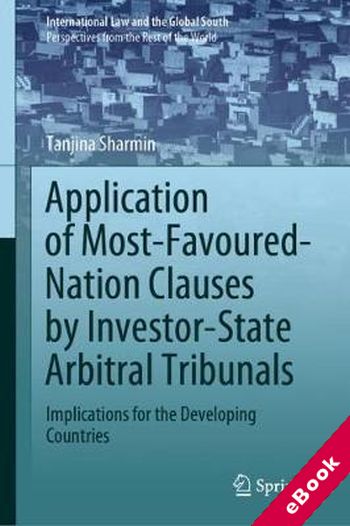We will be closed from 5pm Thursday 17th April for the Easter Bank Holidays, re-opening at 8.30am on Tuesday 22nd April. Any orders placed during this period will be processed when we re-open.

The device(s) you use to access the eBook content must be authorized with an Adobe ID before you download the product otherwise it will fail to register correctly.
For further information see https://www.wildy.com/ebook-formats
Once the order is confirmed an automated e-mail will be sent to you to allow you to download the eBook.
All eBooks are supplied firm sale and cannot be returned. If you believe there is a fault with your eBook then contact us on ebooks@wildy.com and we will help in resolving the issue. This does not affect your statutory rights.
This book comprehensively examines various issues regarding the scope of Most-Favoured Nation (MFN) Clauses in International Investment Agreements (IIAs), and addresses the reform, interpretation, and enforcement of IIAs with a specific focus on the MFN clause. The book begins with a study of the history and evolution of the MFN. It then presents a substantive analysis focusing on the drafting style and how it affects the scope of the MFN; rules of interpretation and arbitral case law on the scope of the MFN, procedural prerequisites to arbitration and jurisdiction of arbitral tribunals, and the implications of adopting an expansive approach to the MFN clause.
The book’s argument centres on the need for arbitral tribunals to interpret the MFN in a manner that reflects the expressed intent of the parties. This requires taking into consideration the text of the MFN, its purpose, and the overall context of the IIA, rather than relying on values and assumptions that have nothing to do with the original intent of the parties. In making this argument, the book draws on Articles 31 and 32 of the Vienna Convention on the Law of Treaties and other interpretative rules. What sets the book apart is its comprehensive coverage of issues concerning the interpretation and application of the MFN in IIAs. At the same time, it addresses issues in connection with an expansive interpretation of MFN clauses, as well as concerns regarding the legitimacy crisis in investor-state arbitration. Accordingly, it contributes to future Investor-State Dispute Settlement (ISDS) reform, while also offering a wealth of theoretical and practical insights for future treaty drafters, arbitrators, and policymakers.